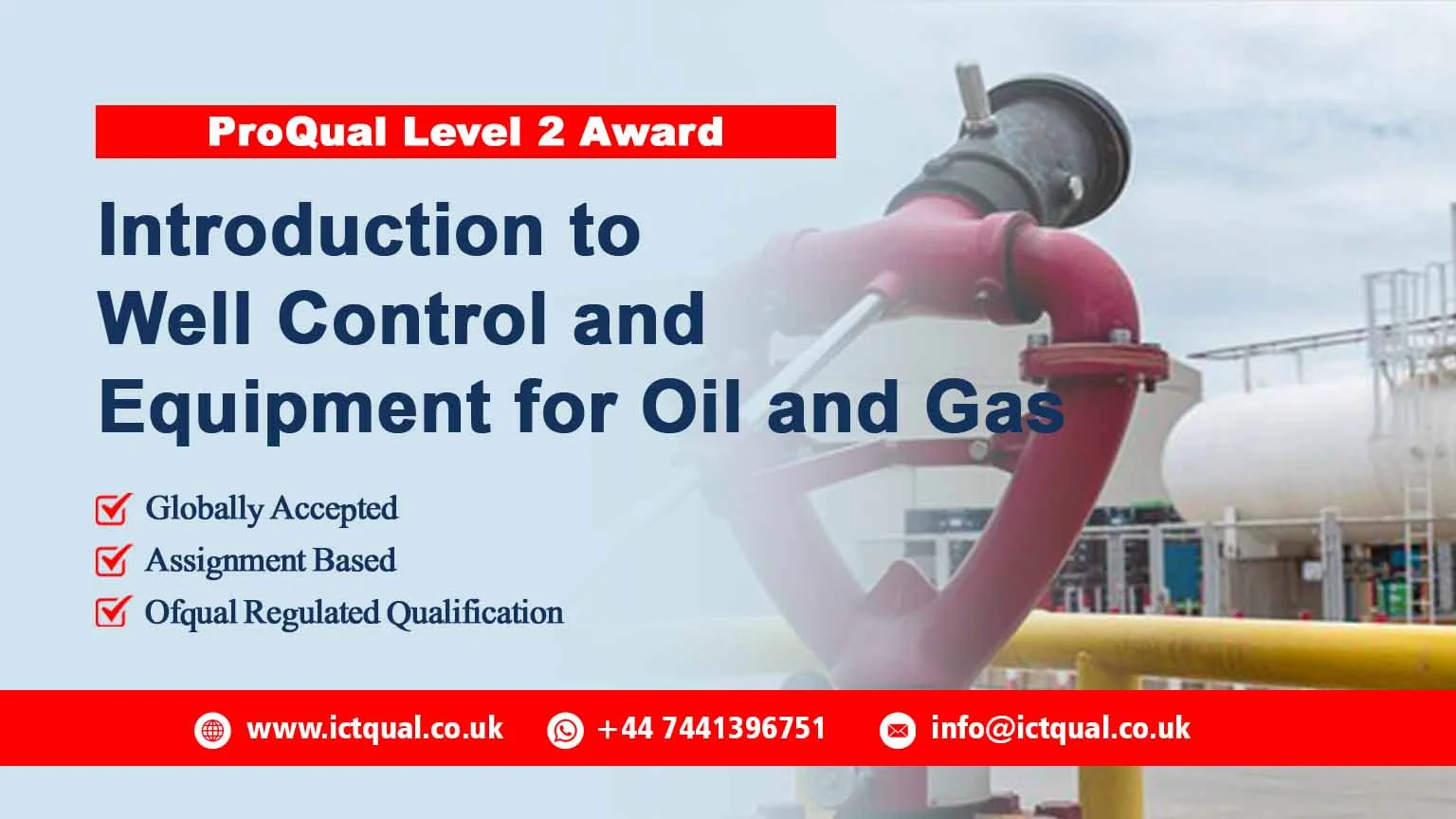The ProQual Level 2 Award in Introduction to Well Control and Equipment for Oil and Gas is a foundational course designed for individuals pursuing a career in the oil and gas sector, particularly in drilling and production operations. This qualification introduces learners to the essential principles of well control, helping them understand how to maintain pressure, manage risks, and ensure operational safety during drilling activities. It is ideally suited for new entrants, support crew, and anyone working around well control systems.
Maintaining well control is a critical aspect of drilling operations, directly affecting the safety of personnel, equipment, and the environment. The ProQual Level 2 Award in Introduction to Well Control and Equipment for Oil and Gas covers the fundamental theories of pressure control, kick detection, and well shut-in procedures. Learners are introduced to the causes of well control incidents and the importance of early intervention to prevent blowouts and other hazardous events.
This course also provides a detailed overview of well control equipment, including blowout preventers (BOPs), choke manifolds, and kill lines. Participants in the ProQual Level 2 Award in Introduction to Well Control and Equipment for Oil and Gas will gain a practical understanding of how this equipment operates under pressure and how it is maintained to ensure reliability. Understanding these systems is vital for those working in field operations, rig maintenance, or technical support roles.
The qualification not only strengthens technical knowledge but also supports a strong safety culture across oil and gas operations. The ProQual Level 2 Award in Introduction to Well Control and Equipment for Oil and Gas emphasizes teamwork, communication, and adherence to international safety standards, making it valuable for individuals and organizations alike. It sets the groundwork for more advanced well control training and certification.
In summary, the ProQual Level 2 Award in Introduction to Well Control and Equipment for Oil and Gas is an essential entry-level qualification that equips learners with the knowledge and awareness needed for safe drilling operations. It lays a solid foundation in both the principles and practical aspects of well control, preparing participants for further development in the high-risk, high-reward field of oil and gas.
Secure your spot in the ProQual Level 2 Award in Introduction to Well Control and Equipment for Oil and Gas. Your journey to a fulfilling and well-compensated career starts here. Ready to take the plunge? Enroll now and fuel your future in the oil and gas industry! Join us today and become a part of the dynamic world of oil and gas. Your success story begins here!
The “ProQual Level 2 Award in Introduction to Well Control and Equipment for Oil and Gas” is a vocational qualification designed to provide individuals with a fundamental understanding of well control principles and equipment used in the oil and gas industry. This award is part of ProQual’s certification offerings, which aim to enhance the knowledge and skills of individuals working or aspiring to work in the oil and gas sector.
Key aspects of this qualification typically include:
- Well Control Fundamentals: Participants will learn the foundational principles of well control, including the importance of maintaining proper pressure and fluid balance during drilling and production operations.
- Well Control Equipment: The course covers various types of equipment used in well control operations, such as blowout preventers (BOPs), choke manifolds, and other safety mechanisms.
- Safety Procedures: Safety is a paramount concern in the oil and gas industry. The qualification includes instruction on safety protocols and procedures to prevent and manage well control incidents.
- Hydrostatic Pressure and Well Control Calculations: Participants will gain knowledge of hydrostatic pressure, pressure gradients, and calculations related to well control, which are crucial for maintaining well integrity.
- Emergency Response: Understanding how to respond effectively to well control emergencies is a key component of the qualification. This includes procedures for shutting down operations and mitigating risks.
- Regulatory Compliance: Participants will become familiar with industry regulations and standards related to well control and equipment, ensuring that they operate within legal and safety guidelines.
- Practical Skills: In some cases, the course may include hands-on training or simulations to reinforce theoretical knowledge and practical skills related to well control and equipment.
The ProQual Level 2 Award in Introduction to Well Control and Equipment for Oil and Gas is a valuable starting point for individuals seeking a career in the oil and gas industry. It equips them with the foundational knowledge necessary to work safely and effectively in roles related to well control and drilling operations. This qualification can serve as a stepping stone for further education and certification in more specialized aspects of the industry.
To achieve the ProQual Level 2 Award in Introduction to Well Control and Equipment for Oil and Gas: Candidates must complete the following single Mandatory unit of 50 Guided Learning Hour.
Mandatory units
The “ProQual Level 2 Award in Introduction to Well Control and Equipment for Oil and Gas” is designed for a specific audience within the oil and gas industry. This course is intended for:
- Entry-Level Workers: Individuals who are new to the oil and gas sector and are seeking foundational knowledge in well control and equipment operations.
- Oil and Gas Industry Aspirants: Those who aspire to pursue a career in the oil and gas industry and want to start with a comprehensive introduction to well control principles.
- Support Staff: Support and administrative personnel working in the oil and gas industry who require a basic understanding of well control and equipment for their roles.
- Health and Safety Professionals: Health and safety officers or professionals responsible for ensuring compliance with safety protocols in oil and gas operations.
- Managers and Supervisors: Entry-level supervisors or managers who need to have a fundamental grasp of well control and equipment to oversee safe and efficient operations.
- Individuals Changing Career Paths: Individuals from other industries who are transitioning into the oil and gas sector and need to quickly acquire essential knowledge.
- Operators and Technicians: Technicians and operators who are involved in drilling, production, or well maintenance and need to understand the principles and equipment involved in well control.
- Contractors and Service Providers: Contractors and service providers who work in collaboration with oil and gas companies and need to adhere to industry standards and safety practices.
- Anyone Seeking Career Advancement: Individuals seeking career advancement within the oil and gas industry who want to strengthen their foundational knowledge in well control and equipment.
It’s important to note that while this course provides an introduction to well control, it may also serve as a prerequisite or stepping stone for more advanced training and certification programs within the oil and gas industry. The course is adaptable to individuals with varying levels of experience and serves as a valuable foundation for building a career in this dynamic and safety-conscious industry.
By the end of this course, participants should be able to:
Introduction to Well Control and Equipment for Oil and Gas
- Understand the origin, history and significance of oil and gas.
- Understand the basic principles and procedures for drilling, completions and workover of a well.
- Understand the fundamental principles of maintaining well control and the requisite well control equipment.
- Be introduced to well control procedures and equipment including types of BOPs.
- Understand well intervention and the impact of workovers and completion design to maximizing field production
- Understand possible issues associated with well integrity
These learning outcomes aim to equip participants with the knowledge and skills needed to work safely and effectively in roles related to well control and equipment within the oil and gas industry. They provide a clear framework for assessing the competence and readiness of individuals completing the course.





